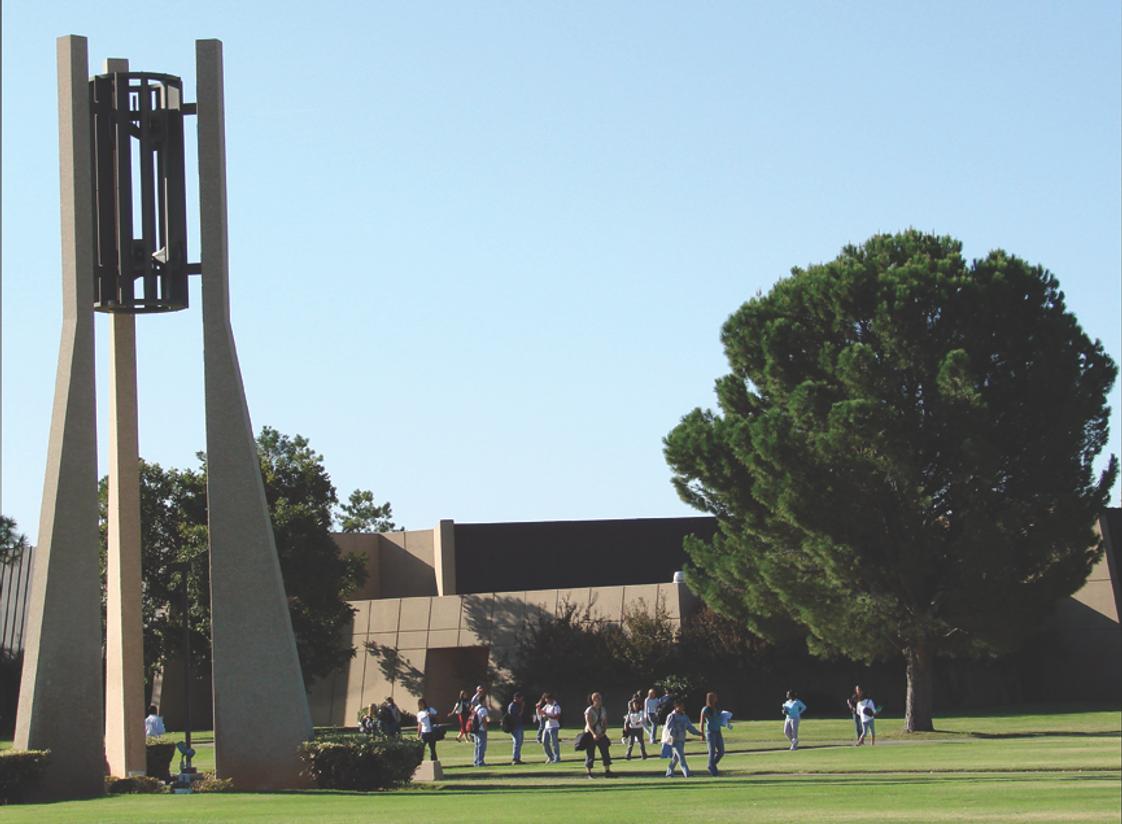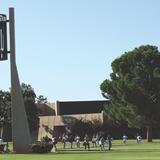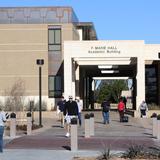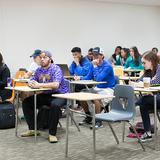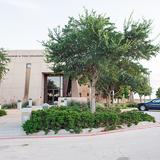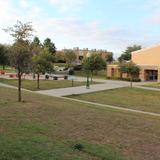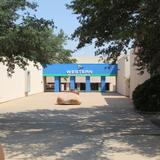- The main campus of Midland College is located at 3600 North Garfield. In addition, the school operates an Advanced Technology Center, Cogdell Learning Center, an Aviation Maintenance Technology Hangar, Professional Pilot Preparation Hanger, Child Care Center, and the Petroleum Professional Development Center throughout the community. Midland College classes are also held at the Williams Regional Technical Training Center in Fort Stockton.
School Highlights
Midland College serves 7,661 students (26% of students are full-time).
The college's student:teacher ratio of 15:1 is lower than the state community college average of 23:1.
Minority enrollment is 69% of the student body (majority Hispanic), which is less than the state average of 74%.
Quick Stats (2025)
- Enrollment: 7,661 students
- In-state tuition: $1,068
- Out-state tuition: $2,196
- Acceptance Rate: 100%
- Student:teacher ratio: 15:1
- Minority enrollment: 69%
- Source: Verified school update
Top Rankings
Midland College ranks among the top 20% of public schools in Texas for:
Category
Attribute
Affordability
School Overview
The teacher population of 496 teachers has stayed relatively flat over five years.
Midland College
(TX) Community College Avg.
Carnegie Classification
Baccalaureate/Associate's Colleges: Associate's Dominant
Baccalaureate/Associate's Colleges: Associate's Dominant
Institution Level
Four or more years
At least 2 but less than 4 years
Institution Control
Public
Private, for profit
Total Faculty
496 staff
262 staff
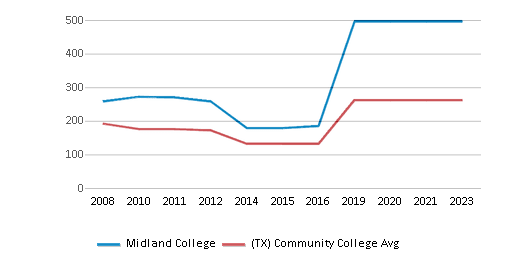
Student Body
The student population of Midland College has grown by 49% over five years.
The student:teacher ratio of 15:1 has increased from 10:1 over five years.
The Midland College diversity score of 0.62 is less than the state average of 0.70. The school's diversity has declined by 13% over five years.
Total Enrollment
7,661 students
1,396 students
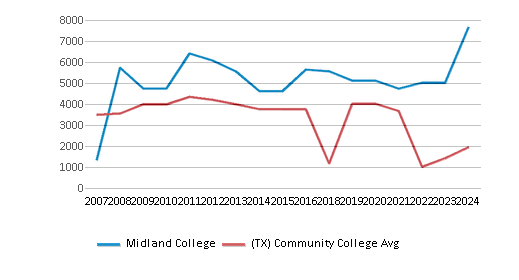
Student : Teacher Ratio
15:1
23:1
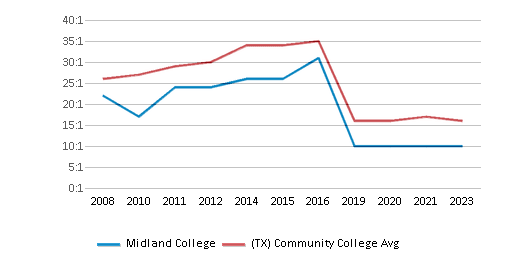
# Full-Time Students
1,967 students
890 students
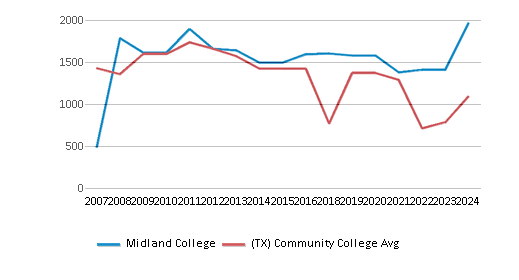
# Part-Time Students
5,694 students
4,022 students
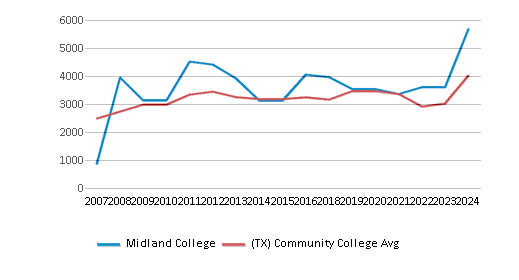
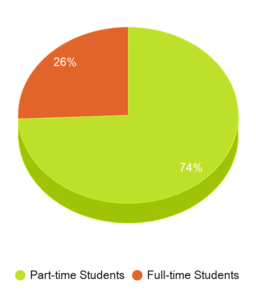
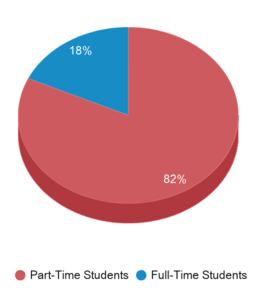
# Enrollment Undergraduate
766 students
403 students
# Full-Time Undergraduate Students
1,967 students
890 students
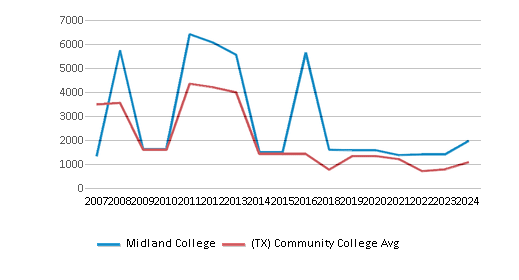
# Full-Time Graduate Students
n/a
40 students
# Part-Time Undergraduate Students
5,694 students
4,022 students
# Part-Time Graduate Students
n/a
47 students
Total Dormitory Capacity
297 students
252 students
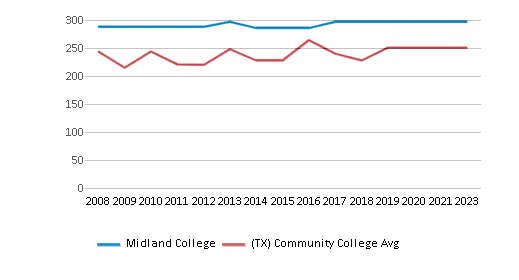
% American Indian/Alaskan
n/a
n/a
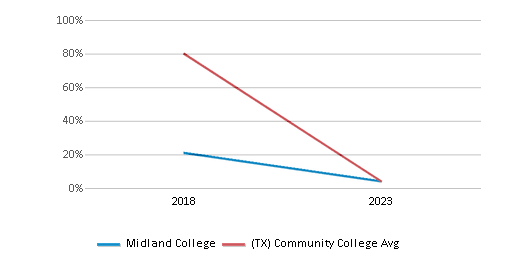
% Asian
3%
6%
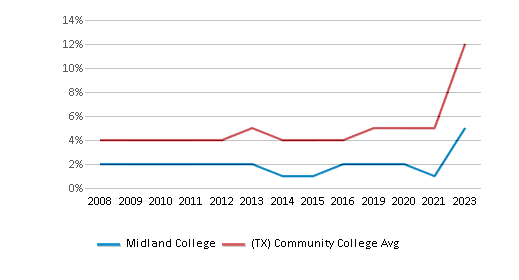
% Hispanic
53%
46%
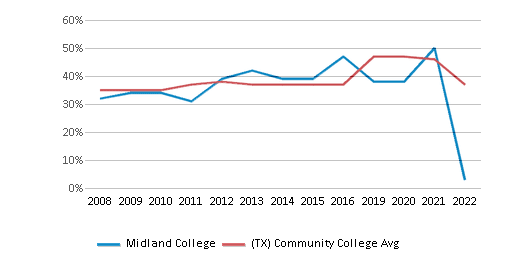
% Black
5%
14%
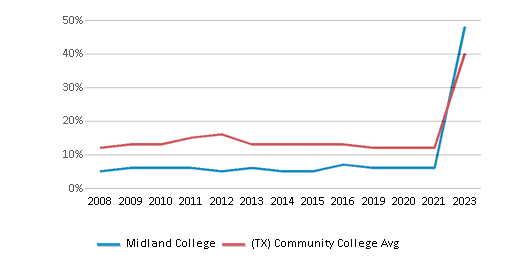
% White
31%
26%
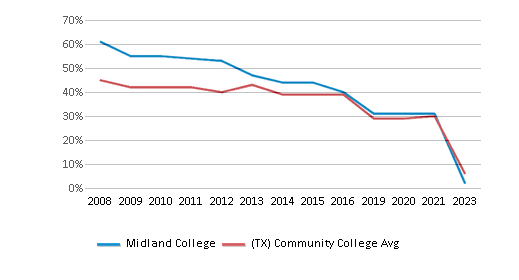
% Hawaiian
n/a
n/a
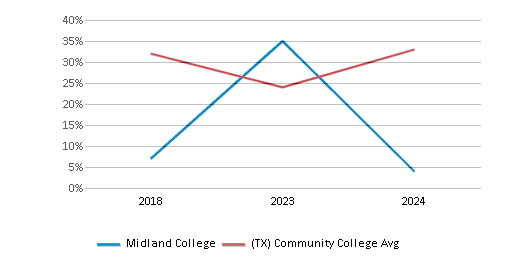
% Two or more races
2%
3%
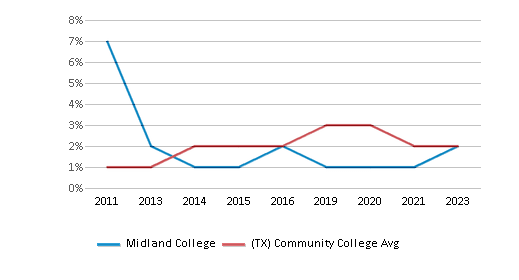
% Non Resident races
3%
2%
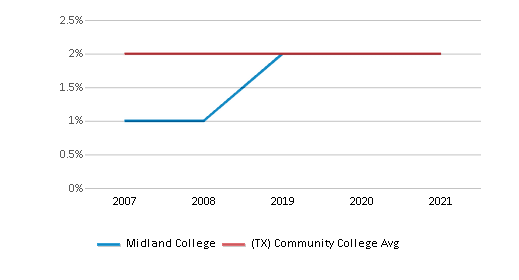
% Unknown races
3%
3%
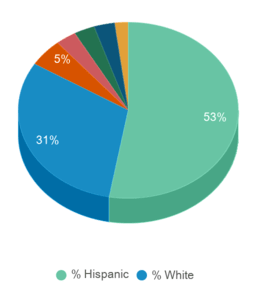
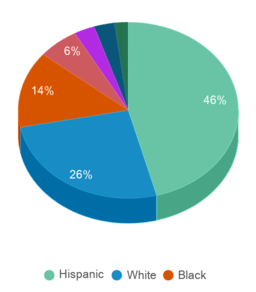
Diversity Score
0.62
0.70
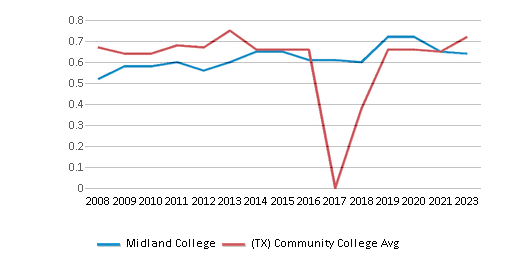
College Completion Rate (Students who graduate in less than 4 years)
n/a
0.5469%
College Completion Rate (Students who graduate in 4 years or more than 4 years)
0.2428%
0.3357%
Average Graduate Earnings (10 Years)
$40,800
$34,600
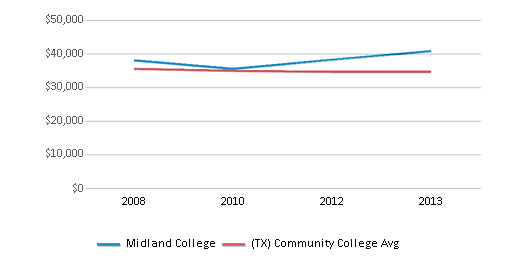
Tuition and Acceptance Rate
The public in-state tuition of $1,068 is less than the state average of $3,316. The in-state tuition has declined by 75% over four years.
The public out-state tuition of $2,196 is less than the state average of $5,750. The out-state tuition has declined by 60% over four years.
In-State Tuition Fees
$1,068
$3,316
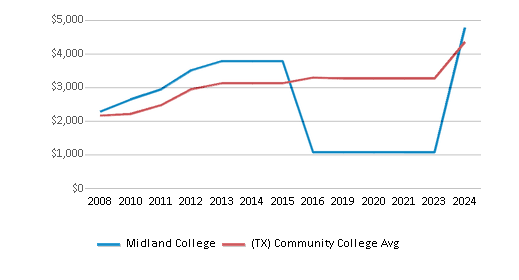
Out-State Tuition Fees
$2,196
$5,750
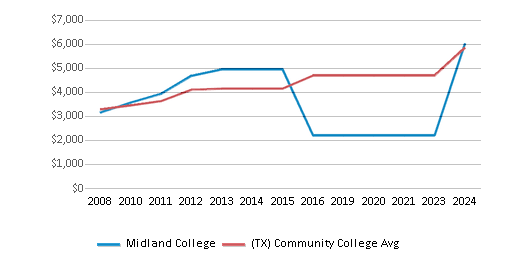
Tuition Notes
Tuition rate is for
% Students Receiving Some Financial Aid
77%
84%
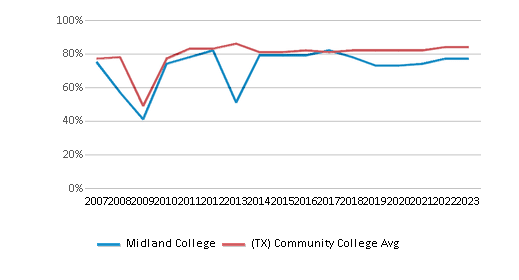
Median Debt for Graduates
$14,875
$10,765
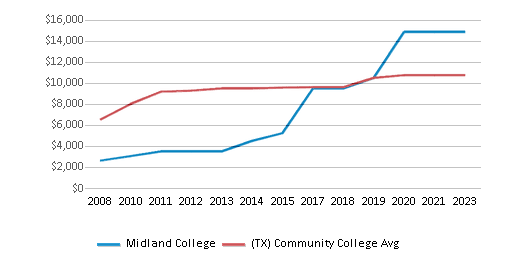
Median Debt for Dropouts
$5,500
$5,500
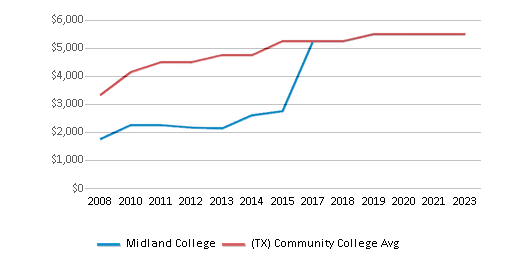
Acceptance Rate
100%
81%
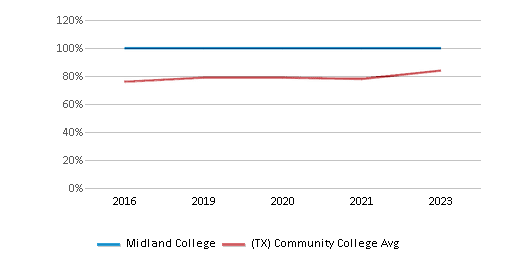
Sports
Total Sports Offered
6 sports
Sports
Baseball, Basketball, Cheering, Golf, Softball, Volleyball
Extracurriculars
Total ExtracurricularsTotal Extra-curric.
27 extracurriculars
ExtracurricularsExtra-curric.
Club or Organization:
Ambassadors, Amtgard, Anime Club, Baptist Student Ministry, Catholic Student Association of Midland (CSAM), Chemistry Club, Education Society, Engineering Club, Every Nation Campus Ministry, Geology Club, International Student Club, Kinesiology Club, LGBTQ+, Phi Theta Kappa Honor Society, Regents, Respiratory Care Club, Sigma Kappa Delta, Spirit Squad, Student Government Association (SGA), Student Nurses Association, Students in Philanthropy (SIP), T.O.G.A., The Navigators, Veterans Association
Arts and Music Programs:
Art Guild, Jazz Band
Recreational Athletic Programs:
LaCrosse Club
Ambassadors, Amtgard, Anime Club, Baptist Student Ministry, Catholic Student Association of Midland (CSAM), Chemistry Club, Education Society, Engineering Club, Every Nation Campus Ministry, Geology Club, International Student Club, Kinesiology Club, LGBTQ+, Phi Theta Kappa Honor Society, Regents, Respiratory Care Club, Sigma Kappa Delta, Spirit Squad, Student Government Association (SGA), Student Nurses Association, Students in Philanthropy (SIP), T.O.G.A., The Navigators, Veterans Association
Arts and Music Programs:
Art Guild, Jazz Band
Recreational Athletic Programs:
LaCrosse Club
Source: 2024 (or latest year available) Integrated Postsecondary Education Data System (IPEDS) , School Administrators
School Notes
- Midland College offers more than fifty associate degree and certificate options, and is a Level II (four-year) institution, accredited to offer a Bachelor of Applied Technology (BAT) degree and a Bachelor of Applied Science degree. Students may also earn upper-level degrees on the Midland campus from various four-year universities. More than 200,000 people have taken classes at Midland College since 1972, and current student enrollment is approximately 6,000.
- The college also invests in the quality of life in Midland. The Phyllis and Bob Cowan Performing Arts Series and the Davidson Distinguished Lecture Series recruit renowned performers and speakers to the campus for free community cultural and entertainment performances and lectures. The campus is also home to the McCormick Art Gallery and co-produces theatre presentations with Midland Community Theatre. The Al G. Langford Chaparral Center, located on the Midland College main campus, hosts concerts, trade shows, and sporting events.
- Midland College's annual operating budget is $65 million. The school is supported by one of the top community college foundations in the nation. Interest from endowments totaling $7 million has been placed into operating budgets for campus upgrades, technology, instruction and other projects. Since 1992 the college has raised in over $00 million from public and private sources. In 2005, to better serve an ever-increasing student body, Midland College passed a $41.8 million bond that is providing newly expanded learning facilities and other campus improvements, which include state-of-the-art classrooms, lecture halls, and laboratory facilities and resources.
- Looking to the future, the faculty and staff of Midland College are committed to instruction that sustains a life-long quest for knowledge and provides students with academic, intellectual, occupational and professional proficiency. Additional information is available on the Internet at www.midland.edu.
Frequently Asked Questions
How much does Midland College cost?
Midland College's tuition is approximately $1,068 for In-State students and $2,196 for Out-State students.
What is the acceptance rate of Midland College?
The acceptance rate of Midland College is 100%, which is higher than the state average of 81%.
What sports does Midland College offer?
Midland College offers 6 interscholastic sports: Baseball, Basketball, Cheering, Golf, Softball and Volleyball.
What is Midland College's ranking?
Midland College ranks among the top 20% of community college in Texas for: Least expensive tuition.
Recent Articles

Obtaining Your Bachelor's Degree at a Community College
Explore the evolving landscape of community colleges offering bachelor's degrees, addressing affordability, accessibility, and workforce needs.

A to Z of Community College Certificates and Courses
From business and healthcare to technology and skilled trades, the article showcases the breadth of options available to students seeking to enhance their knowledge, develop new skills, or pursue career advancement.

What is a Community College?
This comprehensive guide explains what a community college is, its history, and its role in higher education. It covers the types of programs offered, differences from four-year colleges, benefits of attending, and important considerations for prospective students, providing valuable insights for those exploring educational options.



